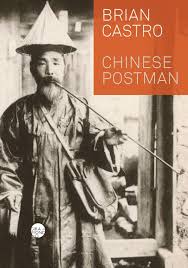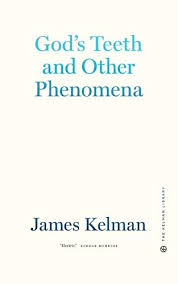I find, more and more, these days that I am reading books by older (or, let’s face it – old) men. There was a time when I thought that old men didn’t have a lot to say that was of any great importance, stuck, as it were, in some sort of past where they would either bang on about their regrets or try to relive some real or imagined glories knowing that new glories were becoming more and more unlikely.
In the last week, I have just finished reading Brian Castro’s new book Chinese Postman and it was a book that really resonated with me. This week I am reading James Kelman’s book from 2022, God’s Teeth and Other Phenomena.
I first started reading Castro in the mid-eighties, nearly forty years ago when I was in my twenties, and he was just a little bit older. Those early novels were dazzling in their inventiveness, their vibrancy and energy. The Chinese Postman still has those elements but in a much slower and reflective way and whilst the protagonist is capable of looking forward, making plans to bring a Ukrainian woman he has been corresponding with to Australia and safety from the war, there is also much looking back over his life.

Privilege is something that I acknowledge, and I never want to make light of certain advantages I receive as a white middle-aged male with a sound education. The degree of alienation, of being the other, that is always present in Castro’s work is something that I can intellectually grasp but is not something that I intuitively understand. I’m not without empathy but I imagine a story such as the Chinese Postman might resonate differently with different readers.
The thing I do have in common with Castro (amongst others, and these are clear in the book when the protagonist talks about favourite books and music or makes literary puns that delight the reader who gets them) is age. He is a couple of years older than I am and we are both standing on the edge of twilight. His protagonist in this novel has a number of pre-occupations including one with the necessity to have access to clean toilets – a result of a dicky prostate. This, happily, is not a concern I share.
One aspect of aging that I find interesting, both in a personal sense and in a literary sense, is the phenomena of memory. I don’t mean this in an almost obsessive Proustian examination but in something different, something to do with perspective and how the past isn’t a constant because it is always considered within the context of the present and, the older I get, the more I think about my own past in different ways. I think I have heard this described as making your own myths.
Old men, it must be noted, are unreliable narrators.
I have written about James Kelman previously on this website and how much I love his unique voice. God’s Teeth and Other Phenomena is a novel composed of many chapters, each one being a beautifully studied piece in its own right about an author who, many years before, had won a literary award called, in this book, The Bankers Prize (Kelman won the Booker back in 1994 for How Late it Was, How Late, – a novel well worth reading). The author has been invited to a provincial arts festival as a writer in residence where he is expected to give readings and host workshops to small audiences, many of whom have never heard of him and those who have are only interested in his work from several decades in the past. Kelman’s protagonist, James Proctor is grump but, if the narrator is to be believed, not without good reason. The book is a satire on the world of writers’ festivals and the arts community and, having been an arts officer in a previous life, I found myself cringing at the self importance of people in the arts, particularly in small towns.

It is often said that older women become invisible and I think this is true but I also think this might be the case for older men. For many of these writers I have found myself reading, there has been a struggle, a fight to remain visible, to remain relevant. I hope that the words of these old men do not just resonate with old men as readers but find broader audiences. I look over my bookshelves and the thousands of books I have collected over the years and there does seem to be a lot by old men (and dare I say, old white men). Some of the authors I have collected over the years weren’t old men when I first started to read them – Gerald Murnane who is now 85 (and surely must win the 2025 Nobel Prize for literature) was only 45 when I bought and read The Plains back in 1984.
I will of course continue to read books by all sorts of writers – good writing cannot nor should it be defined by the nature of the writer – their age, gender or anything else (although having said that, I do not believe that there can be any good writing that is racist, sexist, agist, homophobic or generally right wing and anti-humanist, but that is primarily my own prejudices coming through. Still, do make some time for the words of these old men, raging against the dying of the light.
